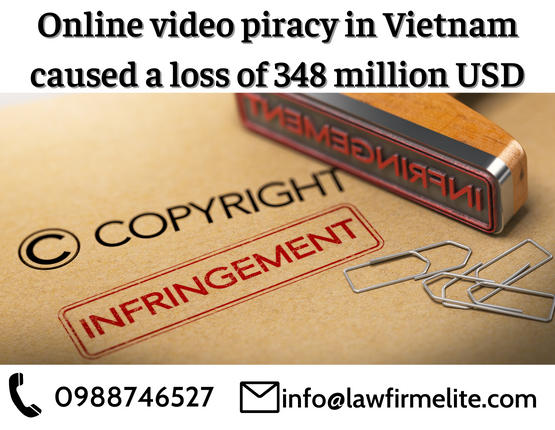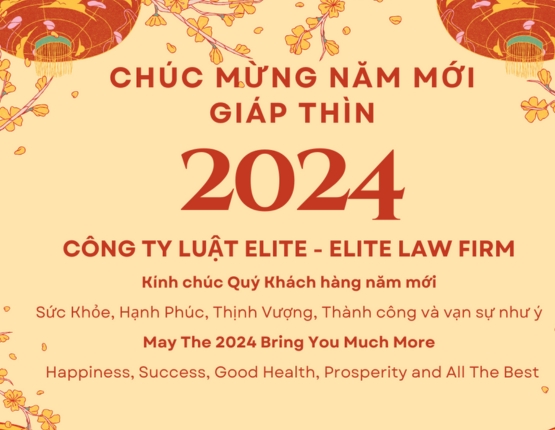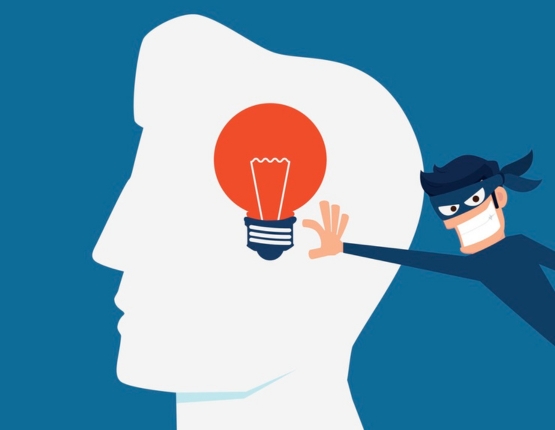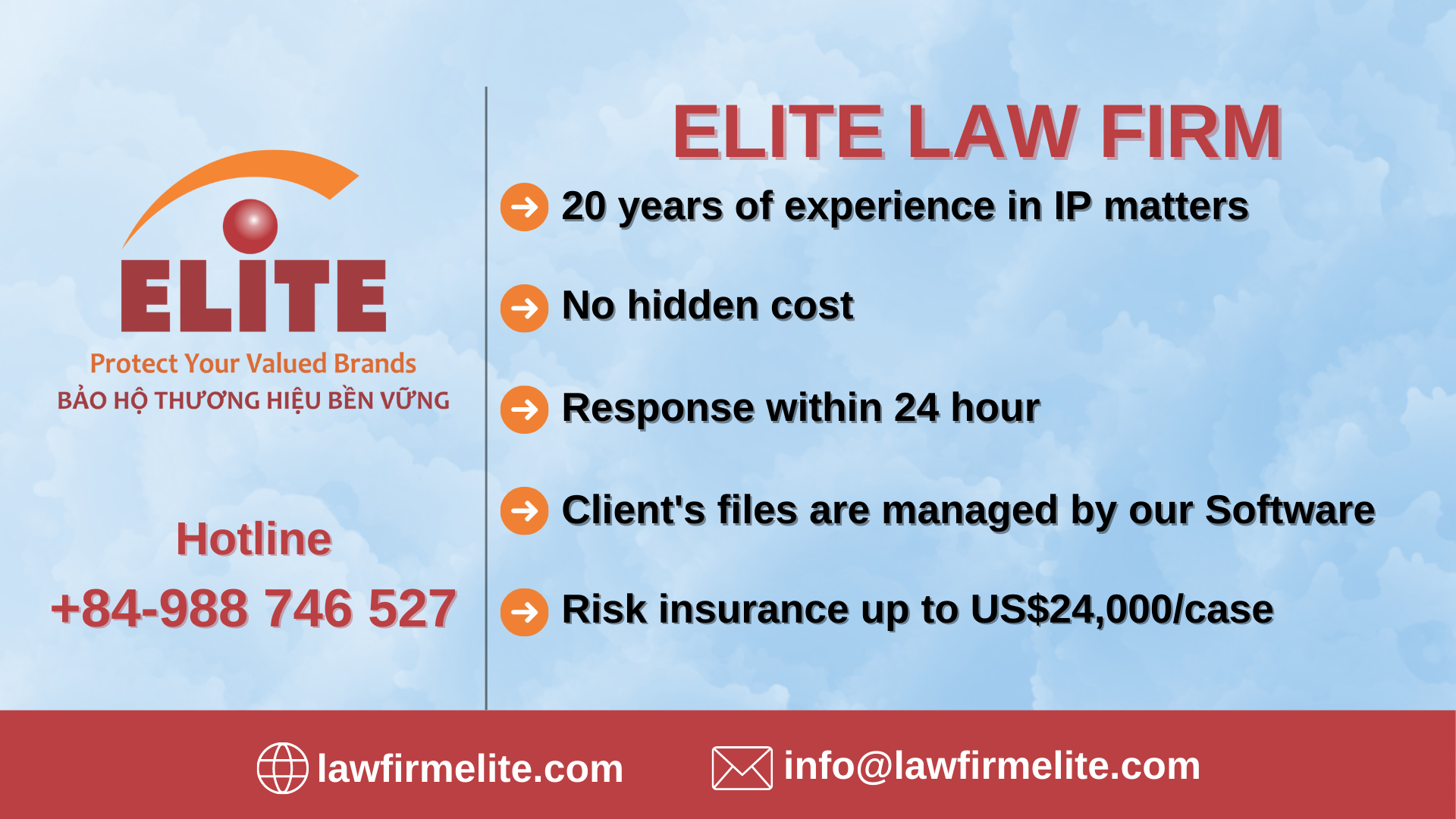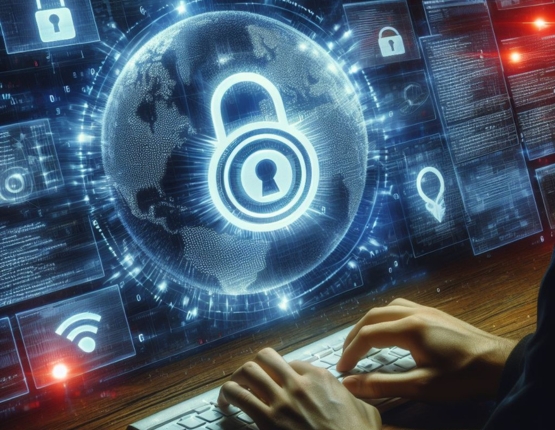
 Email: info@lawfirmelite.com/vi
Email: info@lawfirmelite.com/vi Hotline: (+84) 988746527
Hotline: (+84) 988746527 Tel: (+84-24) 37373051
Tel: (+84-24) 37373051
Copyrights infringement


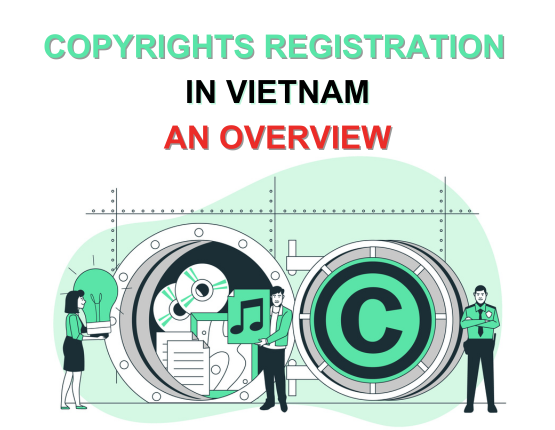
Unveil the Insights: Exploring a Comprehensive Global Survey by the INTA International & Legislative Subcommittee of the Copyright Committee. Covering 78 countries worldwide, this survey scrutinizes copyright office structures, registration requirements, and protection procedures. Join us as we dive into an exclusive overview of Vietnamese Copyright Registration.
Is there an official Copyright Office in your country? If yes, what is its official name? Provide a website, if available. If not, which state body/private organization performs its functions?
Yes. There is an Official Copyright Office in Vietnam, namely the Copyright Office of Vietnam (COV). The official website of COV is http://www.cov.gov.vn/
If the Copyright office is an official body, where does it sit in the state structure? (i.e. what department / division is it connected with) What is the organizational structure of the copyright office?
The Copyright Office of Vietnam (COV) is under supervision of the Ministry of Culture, Sports, and Tourism of Vietnam.
The organizational structure of the COV includes (http://www.cov.gov.vn/tin-tuc/structure):
(i) General Director, 02 Deputy Directors;
(ii) The Bureau/Office Division;
(iii) Copyright and related rights management and International Cooperation Division;
(iv) Copyright and Related Rights Registration Division;
(v) Cultural Industry Management Division;
(vi) Expertise Center (Copyright and Related Rights Assessment Center).
What powers does the office have (main tasks and functions)?
– The main function of the COV is advising and assisting the Minister of the Ministry of Culture, Sports, and Tourism of Vietnam in performing the state management of copyright protection, related rights and cultural industry in Vietnam.
– Yes. The COV has the power to formally register copyrights.
– No. The COV does not have the power to set rates for copyright royalties or similar. Accordingly, rates for copyright royalties shall be agreed upon by the parties or in accordance with the Government’s regulations.
Is the country a party to the Berne Convention?
Yes.
When does copyright arise? Is there a copyright registry/depository in your country?
Under IP Law of Vietnam (Art.6), Copyright shall arise at the moment when a work is created and fixed in a certain material form, irrespective of its content, quality, presentation, means of fixation, language and whether or not it has been published or registered.
There is a copyright registry/depository in Vietnam. The said body is the COV.
What regulations govern the copyright registration procedure?
IP Law of Vietnam 2005 (amended in 2009, 2019), Decree No. 22/2018/ND-CP dated February 23, 2018 of the Government on guidelines for certain number of articles of the Intellectual Property Law and Law on amendments to the Intellectual Property Law 2009 in terms of the copyright and related rights and other guiding regulations mainly govern the copyright registration procedure in Vietnam.
What does the procedure of copyright registration include (main stages, terms, documents required)? Is it possible to file an application for a copyright registration (and all documents required) online?
7.1. The procedure of copyright registration include:
-main stages:
+ stage 1: Filing the copyright application
+ stage 2: formality examination and granting a copyright registration certificate
– terms: 15 working days from the filing date of an acceptable application (in practice, it may prolong).
– Documents:
i) A declaration for registration of copyright or related rights.
ii) Two copies of the work the subject of the application for copyright registration, or two copies of the formulated object the subject of the application for related rights registration;
iii) A letter of authorization where the applicant is an authorized person;
iv) Documents proving the right to file the application where the applicant acquires such right by way of inheritance, succession or assignment;
v) Written consent of the co-authors in the case of a work under joint authorship;
vi) Written consent of the co-owners if the copyright or related rights are jointly owned.
7.2. Is it an application for a copyright registration (and all documents required) online?
Currently, the Copyright Office allows online filing. However, since the online filing system has not yet been completed, after submitting an online application, the applicant still needs to send the originals of the requested documents to the Copyright Office by post or on-site filing.
What are the fees for registering copyrights with the copyright office (if possible)? How long does it typically take from application to registration of copyright?
8.1. What are the fees for registering copyrights with the copyright office (if possible)? Registration of copyright:
– Literary works, scientific works, textbooks, syllabi and other works which are expressed in writing or other characters (referred to as written works – VND 100,000
– Lecture, speech and other talks –VND 100,000;
– Plans, diagrams, maps, topography-related drawings and scientific works – VND 300,000;
– Cinematographic works – VND 500,000;
– Computer programs, data collection programs or other programs run on computers – VND 600,000;
Registration of related rights:
– Performances recorded on Audio/video-recordings and Broadcasting programs – up to VND 500,000;
– Visual recordings – VND 300,000;
– Broadcasting programs– VND 500,000.
8.2. How long does it typically take from application to registration of copyright?
In principle, 15 working days from the filing date of an acceptable application. In practice, it usually takes about 1-3 months from the filing date from application to registration of copyright.
Is a copyright owner able to file a copyright registration application directly or can this only be done through representatives/patent attorneys?
Yes. A Vietnamese copyright owner or a foreign copyright owner, is able to file a copyright registration application directly at the Copyright Office or file through a Vietnamese copyright presentative Agent (Art. 34 of Decree No. 22/2018/ND-CP dated February 23, 2018).
What are the grounds for refusal of copyright registration? Is it possible to appeal the refusal (if so what are the grounds of appeal and procedure)?
Under the IP Law, the Copyright Office shall notify the applicant in writing in a case of refusal to grant a certificate. Under IP Law (Art. 15), subject matters are not covered by copyright protection are (i) News of the day as mere items of press information; (ii) Legal documents, administrative documents and other documents in the judicial domain and official translations of these documents; (iii) Processes, systems, operation methods, concepts, principles and data.
In principle, it is possible to appeal the refusal of the COV. However, the grounds of the appeal
and procedure thereof is now silent (there are not regulations thereof).
What is the legal difference between registered and unregistered copyright? What are the benefits of registered copyright?
In principle, there is no legal difference between registered and unregistered copyright. This is because a copyright arises from the moment the work is created and fixed in a certain material form, regardless of whether it is registered or not (Art. 6 of IP Law).
According to the IP Law Vietnam, Organizations and individuals who are granted certificates of registered copyright or certificates of registered related rights shall not bear the burden of proving such copyright or related rights in a copyright dispute, unless contrary proof is tendered.
Click HERE for the full report
RESOLVING INTELLECTUAL PROPERTY RIGHTS DISPUTES QUICKLY AND EFFECTIVELY
PROTECTION OF INTELLECTUAL PROPERTY RIGHTS SECURELY
FOR DOING BUSINESS STRONGLY, DEVELOPING SUCCESSFULLY
ELITE LAW FIRM – 255 Hoang Van Thai Str., Thanh Xuan Dist., Hanoi, Vietnam
Tel: 0243 7373 051 | Hotline/Whatapps: 0988 746 527 | Email: info@lawfirmelite.com/vi
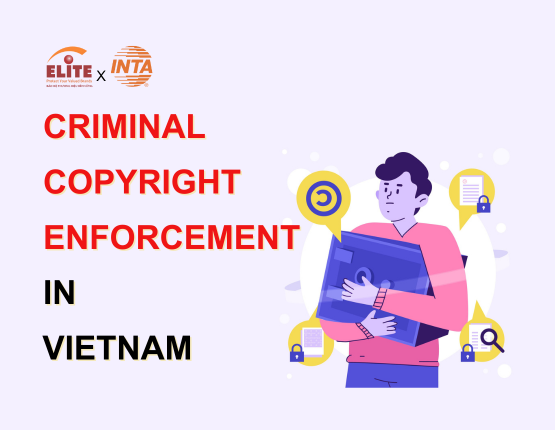

Embark on a journey of remarkable insights as we delve into INTA’s comprehensive international survey on criminal copyright enforcement across 44 countries. This revised edition not only explores copyright protection requirements, available remedies, and more, but also unveils invaluable Vietnamese perspectives. While this survey serves as a preliminary guide, highlighting the dynamic nature of laws, its Vietnamese insights will empower you to shape your copyright enforcement strategies effectively. Get ready to unlock a world of knowledge tailored to Vietnam’s unique landscape.
1. What “works” are subject to copyright (List in alphabetical order)?
We would like to advise that under Article 14 of Vietnam IP Law these following works are subject to copyright protection:
1.Architectural works;
2.Cinematographic works and works created by a process analogous to cinematography (below collectively referred to as cinematographic works);
3.Computer programs and data
4.Dramatic works;
5.Folklore and folk-art works of folk culture;
6.Lectures, addresses and other sermons;
7.Literary and scientific works, textbooks, teaching courses and other works
8.Musical works;
9.Photographic works;
10.Press works;
11.Sketches, plans, maps, and drawings related to topography, architecture, or scientific works;
12.Works of art, works of applied
2. Is there an exhaustive list of copyrightable works?
No.
3. (If no exhaustive list, outline) requirements for obtaining copyright protection.
We note that under IP Law of Vietnam, requirement for obtaining copyright protection include:
- A work is created directly by a natural person (Art. 12(a) and 14.3)
- A work must be fixed in a certain material form (Point 2, 6)
- A work must be completed (Point 4, 19)
- A work has to have originality (Point 3, 14)
We note that the following objects are not protected as copyrighted works (not covered by copyright protection) under Art. 15 of IP Law of Vietnam:
1. News of the day as mere items of press
2. Legal documents, administrative documents and other documents in the judicial domain and their official translations of these documents.
3. Processes, systems, operation methods, concepts, principles, and
4. Is copyright registration required to initiate a civil case?
No. In principle, a copyright registration certificate is not required to initiate a civil case under IP Law, Civil Code and other regulations of Vietnam. However, in this case, a copyright holder and a plaintiff need to provide evidence proving he or she has created the original work and is the true owner of the work before the court.
5. Are there any exceptions to the registration requirement to initiate a civil case?
No.
6. What types of infringement can be used to initiate a civil case?
The following types of copyright infringement can be used to initiate a civil case (under Art. 28 of IP Law of Vietnam)
1. Appropriating copyright to literary, artistic, or scientific
2. Impersonating
3. Publishing or distributing works without permission of authors.
4. Publishing or distributing works under joint-authorship without permission of co-authors.
5. Modifying, mutilating or distorting works in such a way as prejudicial to the honor and reputation of
6. Reproducing works without permission of authors or copyright holders, except: Duplication of works for personal scientific research or teaching purpose and Performance of dramatic works or other performing-art works in mass cultural, communication or mobilization activities without collecting any charges in any
7. Making derivative works without permission of authors or holders of copyright to works used for the making of derivative works, except Transcription of works into Braille or characters of other languages for the blind
8. Using works without permission of copyright holders, without paying royalties, remunerations, or other material benefits according to the provisions of law, except for the cases specified in Clause 1, Article 25 of Vietnam IP
9. Leasing works without paying royalties, remunerations or other material benefits to authors or copyright
10. Duplicating, reproducing, distributing, displaying, or communicating works to the public via communication networks and by digital means without permission of copyright holders.
11. Publishing works without permission of copyright
12. Willingly canceling or deactivating technical solutions applied by copyright holders to protect copyright to their
13. Willingly deleting or modifying right management information in electronic form in
14. Manufacturing, assembling, transforming, distributing, importing, exporting, selling, or leasing equipment when knowing or having grounds to know that such equipment may deactivate technical solutions applied by copyright holders to protect copyright to their
15. Making and selling works with forged signatures of authors of original
16. Exporting, importing, or distributing copies of works without permission of copyright
7. Who has standing to initiate a civil case?
A Copyright holder has the right to initiate a civil case to protect their intellectual property rights (under Art. 198 of IP Law of Vietnam).
8. Do multiple authors all have to join the lawsuit?
Yes. Multiple authors all have to join the lawsuit if the work has joint authors (multiple authors).
9. Is there prosecution for copyright infringement in the digital medium/electronic medium/mobile network/Internet?
Yes, copyright infringement in the digital medium/electronic medium/mobile network/Internet shall be prosecuted under Art. 28 of IP Law and Art. 225 of Criminal Code of Vietnam.
According to Art.28.10 of IP Law, acts of duplicating, reproducing, distributing, displaying, or communicating works to the public via communication networks and by digital means without permission of copyright holders shall be considered as copyright infringement.
Also, under Art.225.1 of Criminal Code of Vietnam, any person who, without permission of the copyright or related right holder, intentionally commits one of the following acts, infringing upon copyright or related rights being protected in Vietnam on a commercial scale trade or gain illicit profits from VND 50,000,000 (about 2,000USD) to under VND 300,000,000 (about 12,000USD) or cause damage to the copyright or related right holders from VND 100,000,000 (about 4,000USD) to under VND 500,000,000 (about 20,000USD) or the infringing goods are valued at between VND 100,000,000 (about 4,000USD) and under VND 500,000,000 (about 20,000USD). From 100,000,000 VND to under 500,000,000 VND, the offenders shall be subject to a fine of from 50,000,000 VND (about 2,000USD) to 300,000,000 VND (about 12,000USD) or a non-custodial reform for up to 03 years:
1. Copying works, phonograms, or video recordings;
2. Distributing to the public copies of works, copies of phonograms, copies of video
10. If online copyright infringement is actionable will courts exercise a long-arm jurisdiction over a counterfeiter that is outside the territorial jurisdiction of the local court?
No.
11. List the remedies provided for infringement in the jurisdiction (injunction/damages and profits/statutory damages/seizure and disposition of infringing articles/attorneys’ fees and costs).?
Under Art. 202 of IP law of Vietnam, the remedies provided for IP/copyright infringement in Vietnam include:
1. Compelling the termination of infringing acts;
2.Compelling the public apology and rectification;
3. Compelling the performance of civil obligations;
4. Compelling the payment of damages;
5. Compelling destruction, distribution or use for non-commercial purposes of goods, raw materials, materials and means used for the production or trading of intellectual property right- infringing goods, provided that such destruction, distribution, or use does not affect the exploitation of rights by intellectual property right
12. Damages/Profits: If available, how do the courts measure damages?
According to Art. 204 of IP Law of Vietnam, principles for determining damage caused by infringement of intellectual property rights are as follows:
Damages caused by acts of infringing upon intellectual property rights/copyrights include:
1. Material damage, including loss of property, decrease in income, profit, loss of business opportunities, and reasonable costs to prevent and remedy the damage;
2. Mental damage includes loss of honor, dignity, prestige, reputation, and other mental losses caused to authors of literary, artistic, or scientific works; Performers; Authors of inventions, industrial designs, layout designs, plant
3. The degree of damage is determined on the basis of actual losses suffered by the intellectual property right holder due to acts of infringement of intellectual property rights.
13. Damages/Profits: Are there legal minimums and maximums to damages?
Yes. There are legal minimums and maximums to damages in some cases. Under Art. 205 of IP Law, basis for determining the level of compensation for damage caused by infringement of intellectual property rights/copyrights are as follows:
1. In cases where the plaintiff can prove that the act of infringing upon intellectual property rights has caused material damage to him/her, he/she has the right to request the Court to decide on the level of compensation according to one of the following grounds:
2. Total material damage in monetary terms plus profits earned by the respondent from committing acts of infringing upon intellectual property rights, if the plaintiff’s reduced profits have not been included in the total material damage;
3. The price for licensing the right to use an intellectual property object, assuming that the defendant is assigned the right to use that object by the plaintiff under the contract to use the intellectual property object, within the scope corresponding to the act of infringement; offenses committed;
4. Physical/material damage by other calculation methods proposed by the intellectual property right holder in accordance with the provisions of law;
5. In case it is not possible to determine the compensation level for material damage according to the grounds specified at Points a, b and c of this Clause, the compensation level for material damage shall be fixed by the Court, depending on the level of damage, but not exceeding VND 500,000,000 (about 20,000USD).
6. In cases where plaintiffs can prove that acts of infringing upon intellectual property rights have caused mental damage to them, they have the right to request the Court to decide on the compensation level between VND 5,000,000 (about 250USD) and VND 50,000,000 (about 2,500USD), depending on the level of the (mental)
7. In addition to the compensation for damage specified in Clauses 1 and 2 of this Article, the intellectual property right holder has the right to request the court to force an organization or individual that commits acts of infringing upon intellectual property rights to pay reasonable costs to hire a lawyer/lawyers.
14. Post Seizure: How are goods dealt with at end of civil lawsuit
Under Art. 202 of IP Law of Vietnam, at end of civil lawsuit, the plaintiffs may request or the court may order to compel destruction, distribution or use for non-commercial purposes of goods, raw materials, materials and means used for the production or trading of intellectual property right-infringing goods, provided that such destruction, distribution, or use does not affect the exploitation of rights by intellectual property right holders.
15. Court: Is there a specialized court(s) to adjudicate copyright infringement cases.
No. At present, there is not any specialized court(s) to settle copyright infringement cases in Vietnam. All copyright infringement cases shall be handled by economic Court belonging to People’s Civil Court at provincial court level.
16. Limitation: If applicable, what is the time limit for commencement of legal proceedings?
Damages for infringement on economic rights of copyrighted works must be claimed within 03 years, from the date that the copyright holder knows (material) damages (under Art. 588 Civil Code).
There is not any regulation relating to the time limit (status of limitation) for commencement of legal proceedings for claim for mental damages of copyright infringement. Accordingly, the copyright holder can claim for mental damages of copyright infringement as to the copyright infringer at any time as soon as he/she finds out a mental copyright infringement.
17. Key benefits in Civil Action
We opine that key benefits in civil action shall include (but not limited to):
– Judgments have high legal value, forcing the infringing party to execute;
– The copyright holder is partially reimbursed for damages when the work is infringed;
– Forcing an apology to the infringing party must make a public apology;
– Restore the reputation of the right holder;
– Actively protect your intellectual property
18. Key Challenges of Civil Action
We think that key challenges of civil action shall include (but not limited to):
(i) Difficult to enforce judgment;
(ii) Time consuming;
(iii) Compensation level still is not high enough for preventing copyright infringement;
(iv) it is difficult to gather evidences proving actual damages for the plaintiff/copyright holder;
(v) Cost for settling a copyright infringement case in court is high.
Click HERE for the full report.
RESOLVING INTELLECTUAL PROPERTY RIGHTS DISPUTES QUICKLY AND EFFECTIVELY
PROTECTION OF INTELLECTUAL PROPERTY RIGHTS SECURELY
FOR DOING BUSINESS STRONGLY, DEVELOPING SUCCESSFULLY
ELITE LAW FIRM – 255 Hoang Van Thai Str., Thanh Xuan Dist., Hanoi, Vietnam
Tel: 0243 7373 051 | Hotline/Whatapps: 0988 746 527 | Email: info@lawfirmelite.com/vi





